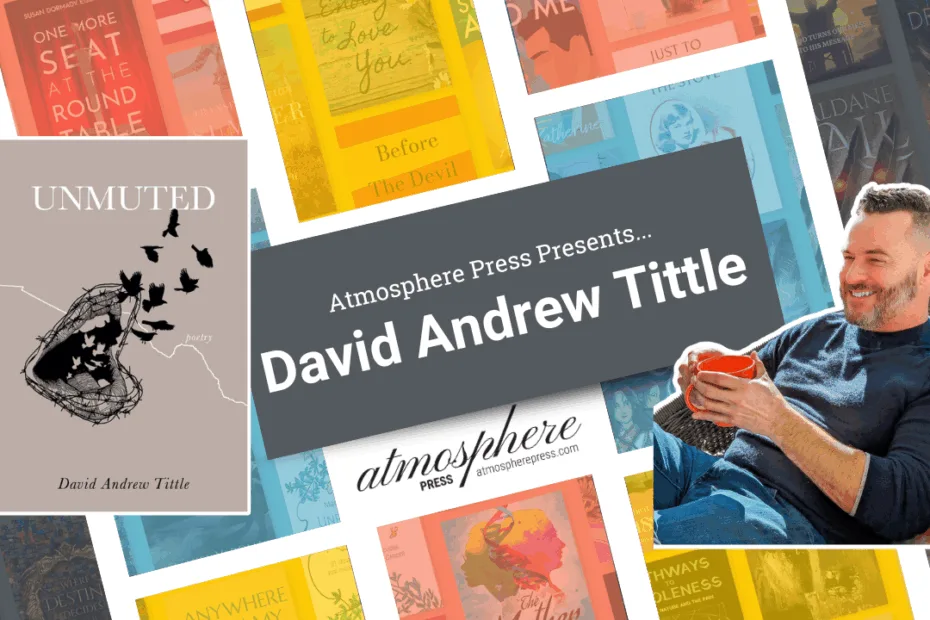An Interview with David Andrew Tittle

David Andrew Tittle is a multicultural poet and writer, born and raised on the US/Mexico border in Calexico, California. His work blends sharp social commentary with wit and moments of raw tenderness, exploring identity, resistance, love, grief, and moral clarity.
A Yale alum, he lives and writes in Los Angeles.
What inspired you to start writing this book?
I write constantly, but usually my poetry is kept private—a diary of sorts, I suppose. But the more the state of our country’s conversation deteriorated, the more frustrated I became with feeling I didn’t have a voice. Unmuted was my realization that not having a ‘platform’ and not having a voice are two different things—that I could say the things I wanted (or needed) to say, and the very act of saying them had power. Even if no one was listening to me specifically, by adding my sounds to the chorus, I could still have a positive impact on the volume of the ideas and voices I support. So, I guess the short answer to your questions is: I was inspired by my desire to change the world, and the realization I didn’t have to wait for someone to hand me a mic or a book deal to do it.
Tell us the story of your book’s current title. Was it easy to find, or did it take forever?
Honestly, once I had the ‘why’ of the book, Unmuted presented itself as the title pretty quickly. Not only did it fit the theme of speaking truth, even if uncomfortable, it also seemed like a perfect title for a debut book from an author who’d written in relative ‘silence’ his entire life.
If your book had a soundtrack, what are some songs that would be on it?
This is a fun question! I feel like there would definitely be some sixties-era protest music—think the Forrest Gump soundtrack, or even the soundtrack from Good Morning, Vietnam. There was a lot of that in my house growing up, and my parents were both activists during the civil rights movement, so Unmuted certainly draws directly from some of that energy—Dylan, Simon and Garfunkel, Joan Baez, Nina Simone. But I also think some of my poetry would be best backed by some of the jazz that came out of the ‘cool’ era, and others draw heavily from spoken word and would sit comfortably over hip hop beats, Latin rhythms, or even tribal drums.
What books are you reading (for research or comfort) as you continue the writing process?
At the moment, I couldn’t point you to a specific book attached to my current projects. But I am spending a lot of time trying to reacquaint myself with the current poetry landscape and, despite it being disheartening at the outset, I’m starting to find people writing real poetry tucked into places I wish more people were looking at.
What other professions have you worked in? What’s something about you that your readers wouldn’t know?
I was people leader in the sales and business development space for an extremely large corporation for twenty years. Given the fact I studied theater, literature, and sociology at Yale University, that career amounted to feeling like I spent two decades wearing an itchy, ill-fitting suit.
Who/what made you want to write? Was there a particular person, or particular writers/works/art forms that influenced you?
My list of influences would be too long to list—I grew up without a television in my house, so I started inhaling words from the very beginning of my life and wanting to write was a natural progression of that—not unlike someone wanting to make movies because they were raised by a TV. If I had to come up a dramatically impartial list…Mark Twain, Tolkien, CS Lewis, Robert Frost, Silvia Plath…but, already, I’m drowning in thoughts about who I’m leaving out!
Where is your favorite place to write?
I don’t know if I’d say I have a ‘favorite’ place to write. Poetry, for me, is a bit like a sneeze: it comes out when and where it feels like, sometimes violently, and often leaving me surprised that that thing used to be inside me. But I do find I enjoy writing in my living room. The lighting is great. There are several comfortable places to sit. But, mainly, I think I like writing there because there’s plenty of space for my dogs to spread out and keep me company.
What advice would you give your past self at the start of your writing journey?
Every word matters. The ones you read. The ones you ignore. The ones you chase, and the ones that catch you no matter how fast you run. Don’t believe all of them and don’t give any of them too much power. But learn them. Keep them. Try them and taste them and twist them into as many shapes as you can. You’ll make so many beautiful things with them before you’re finished.
What’s one thing you hope sticks with readers after they finish your book?
I would love for people to feel like they just read something familiar and foreign at the same time. And for that experience to have been good enough for them to want to figure out what that feeling means for them.
Are you a writer, too? Submit your manuscript to Atmosphere Press.

Atmosphere Press is a selective hybrid publisher founded in 2015 on the principles of Honesty, Transparency, Professionalism, Kindness, and Making Your Book Awesome. Our books have won dozens of awards and sold tens of thousands of copies. If you’re interested in learning more, or seeking publication for your own work, please explore the links below.
